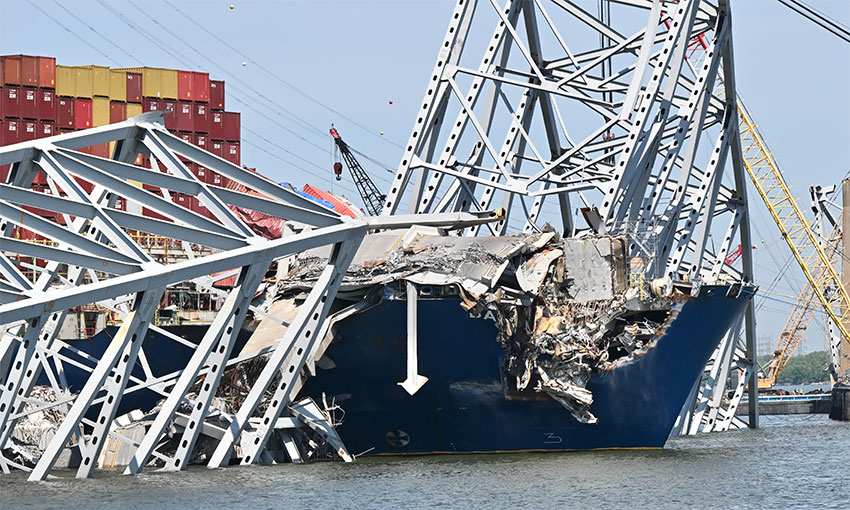PLANS by the US Army Corp of Engineers to use explosives to assist in the removal of the section of Baltimore’s Francis Key Scott Bridge still laying over the bow of the containership Dali were delayed over the weekend by lightning storms.
The Key Bridge Response Unified Command will use small, strategically-placed charges in conjunction with precision cuts in span four of the bridge in what is said to be “the safest and swiftest method” to remove the bridge piece and refloat the ship. The work was planned for Saturday night, but has been rescheduled to 1700 hrs tonight (US time).
“This is an industry-standard tool in controlled demolition that will break the span into smaller pieces, which will allow the work of refloating the vessel and removing it from the federal channel,” the Unified Command said. The smaller sections will allow easier removal of wreckage by cranes and barges.
“We remain focused on restoring the Marine Transportation System, while ensuring the protection of the public and the environment,” Capt. David O’Connell, Key Bridge Response Federal On-Scene Coordinator, said. “By using precision cuts, we reduce risks to our personnel and can safely and efficiently continue clearing the channel for the Port of Baltimore.”
The bridge over the Patapsco River collapsed after being struck by the powerless Dali on 26 March as it departed the port. Four temporary navigation channels have been opened to allow most ships trapped in the port to leave and others to enter, but Dali’s removal is critical to the full resumption of marine traffic. Some shipping companies have begun advertising the resumption of calls as soon as 22 May.
Meanwhile, Reuters reports that the U.S. House Transportation and Infrastructure Committee will hold a hearing on Wednesday (US time) on the federal government’s response to the Dali allision. The hearing will include Federal Highway Administrator Shailen Bhatt, National Transportation Safety Board Chair Jennifer Homendy and senior officials with the U.S. Coast Guard and Army Corps of Engineers. The NTSB is expected to announce preliminary findings from the investigation next week.
Maryland has estimated it will cost US$1.7 billion to $1.9 billion to rebuild the bridge and expects it will be completed by autumn 2028. Congress is working on legislation that would waive the current requirement that the state pay 10% of the rebuilding costs and ensure there is enough money in a federal rebuilding fund, Reuters reported. The U.S. Department of Transportation previously provided an initial $60 million in emergency funds to clear debris and start the process of rebuilding the bridge.





